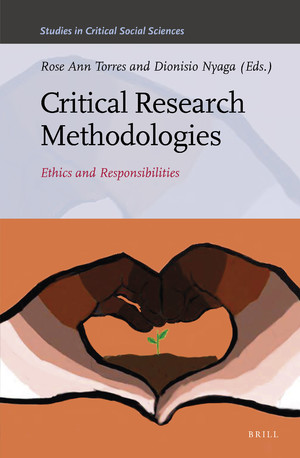
Rose Ann Torres, Dionisio Nyaga
Critical Research Methodologies. Ethics and Responsibilities
Brill
ISBN : 978-90-04-44556-7
155,00 €
PRÉSENTATION
We live in a society that promotes the universal process of producing knowledge and truth making as fundamental social process. Such promotion of universality seems to subjugate others forms of knowing rendering them invisible, unintelligible, and ineligible and subsequently outside the community of knowing. This has material and symbolic consequences in terms of how research informs policy and subsequent victimization of those who live, and experience subjugation meted by Western truth making universalism. In the words of Foucault, this book is an insurrection of subterranean and clandestine knowledges in ways that provide not just an alternative process of knowledge production but affirms local knowledge as necessary in production of a just society. The book looks at research as a social justice and transformational process that should speak of people’s ways of live without necessarily streamlining them into numbers. The book is a critically reflexive project in terms of returning processes of knowledge production to the local space rather than imagining them as entirely centred in the structure. To imagine this book as reflexive exercise is to break boundaries of knowledges in ways that come to imagine how local performs global in very complicated and complex ways. This book is a resurrection of local knowledges steeped in creative and imaginative reflexive methodologies that come to reorient how we come to know what we know, the values and realities that mark what we know and the how of knowledge production. It centres subjugated voices and knowledges as fundamental in production of knowledge.
Contributors include: Katie Bannon, Elizabeth Charles, Khulood Agha Khan, Dionisio Nyaga, Fritz Pino, and Rose Ann Torres.
Rose Ann Torres, Ph.D. (2012), University of Toronto, is an Assistant Professor of Sociology in the Department of Social Science at the University of New Brunswick Saint John. She has published books and many articles on Asian, African, Indigenous, and Women and Gender studies.
Dionisio Nyaga, Ph.D. (2019). University of Toronto, is Lecturer of Social Work at Ryerson University. He has published books, and many articles on African, Anti-Blackness, Gender, and Social Work.
SOMMAIRE
Introduction
Critical Research Methodologies
Rose Ann Torres and Dionisio Nyaga
PART 1
Overview of Critical Research Methodologies
1 – Critical Research Methodologies
Positionality, Ethics, Power
Dionisio Nyaga
2 – Research Methodologies
History, Issues, Tensions
Rose Ann Torres
3 – Torn Apart
Racialized Feelings and the Ethics of Doing Research with One’s Own Community
Fritz Pino
PART 2
Types of Critical Research Methodologies
4 – Critical Ethnography
Discussions of Ethics and Principles
Rose Ann Torres
5 – My Blackness is African
Looking at Kenyan Man through Black/Afrocentric Methodologies
Dionisio Nyaga
6 – Storytelling
A Critical Narrative Approach
Rose Ann Torres
7 – Research as an Inconsolable Mourning
Reimagining Pedestrian Research
Rose Ann Torres and Dionisio Nyaga
PART 3
Application of Critical Research Methodologies
8 – A Black Woman’s Perspective on Leadership and Risk-Taking
Exploring Research Methodologies That Can Transcend the Discourse of Mainstream Leadership Thought
Elizabeth Charles
9 – Accessing Math Anxiety in Male Elementary Teachers as Learners and as Teachers
Khulood Agha Khan
10 – Connecting the “Here and Now” with “What Could Be”
A Critical Analysis of Imagination as Method Engaging Queer Futurities
Katie Bannon
11 – Black Afrocentric Methodologies
Beyond Colour-Coated Investigation
Dionisio Nyaga
Afterword
Using Critical Research Methodologies: The Significance of Reflexivity, Resistance, and Response
Rose Ann Torres and Dionisio Nyaga/i>